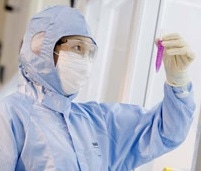Global
Analytical Expertise and Quality Management
We provide ranges from standard electronic grades, up to the highest quality levels available in the market. The challenge of quality consistency is to maintain impurities of cations, from 1 ppm to the lowest ppt range of between 100 ppt and even 10 ppt. Our quality control and quality management team is at the forefront of ensuring BASF's customers receive reliable chemical solutions that will help them to be more successful.
Our labs also deliver service from the ease of start-ups and certification, to troubleshooting and inter-laboratory comparison.
Our labs work closely with our R&D team to develop new analytical methodology for the new products, supporting them findling out the right, state-of-the-art methodology and its limitation. This includes the operational analytical method for commercialization.
Skill and specialization are key factors for analytical accuracy. At BASF, each specialist possesses expert knowledge and takes full responsibility for their specialized area.
Statistical methods are routinely used for documenting the quality of our products. The results are reported to our customers on a regular basis, via our established laboratory Information management system (LIMS). With the ability to store and keep track of large amounts of data, LIMS ensures better quality control checks, increased accuracy and the elimination of data entry, via on-line instruments.
Our labs are always ready when you need them the most, standing by 24 hours a day, seven days a week to provide continuous customer support and fast turn around times.
Our QC Network
Using analytical techniques and experience drawn from the entire BASF Group, we can provide customers with expert analysis services throughout our established network of strategically located QC laboratories in key markets.

1. Assays
Assay determination by:
-
Auto-titration Gas Chromatography (GC)
-
UV-Vis spectrometry
-
Total Organic Carbon (TOC) analysis
-
Karl Fischer (KF) titration
-
High performance liquid chromatography (HPLC)
2. Anion Impurity Analysis
Anion impurity determination by:
-
Ion chromatography (IC)
-
Turbidimetry UV-Vis spectrometry
-
Wet chemistry methods
3 Trace Metal Analysis
Trace metal determination by:
-
Inductively coupled plasma mass spectrometry (ICP¬MS), including high resolution ICP-MS (HR-ICP-MS)
-
Inductively coupled plasma optical emission spectrometry (ICP-OES)
-
Graphite furnace atomic absorption spectrometry (GF-AAS)
-
operate in harmony with today's advanced sample pretreatment techniques, we can analyze the trace metal impurities of chemicals to single digit ppt levels.
4. Liquid Particle Measurement
Particle determination by:
-
Liquid particle counters
-
Particle size distribution analyzer
-
Graphite furnace atomic absorption spectrometry (GF-AAS) - Single particle optical size analyzer
5. Other Properties
Other properties determined are:
-
pH value
-
Density
-
Surface tension
-
Conductivity
-
Viscosity
-
Etching rate
